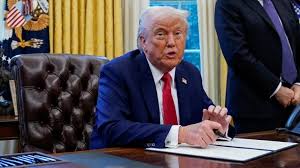President Donald Trump's proposed 25% tariffs on Canada and Mexico have been paused for at least a month, marking a significant development in the ongoing trade tensions between the United States and its neighbors. The decision to delay the tariffs came after Mexico and Canada made commitments to enhance border security and combat drug trafficking, addressing key concerns raised by the Trump administration.
Both Canada and Mexico, as the largest trading partners of the US, had previously threatened retaliatory measures if Trump went ahead with imposing tariffs. In response to these escalating trade tensions, Canada announced plans to appoint a "fentanyl tsar" to combat the illicit drug trade, while Mexico committed to deploying 10,000 troops to its border as part of the agreement with Trump.
The announcement of the tariff pause provided some relief to the stock markets in the US and Canada, which had experienced turbulence amidst fears of a potential trade war. Despite initial losses, the markets showed some resilience as investors reacted to the news of the temporary reprieve on tariffs.
Canadian Prime Minister Justin Trudeau disclosed details of a new $1.3 billion border security plan aimed at strengthening security measures, disrupting the fentanyl trade, and enhancing coordination with US law enforcement. The plan includes the deployment of drones and Black Hawk helicopters for surveillance and intelligence directives to combat organized crime and drug trafficking.
The decision to pause the tariffs on Canadian imports was met with a mix of relief and cautious optimism by Canadian politicians and business leaders, who see it as a temporary respite from the looming economic disruptions. Ontario Premier Doug Ford, for instance, announced a temporary halt to retaliatory measures but emphasized the province's readiness to respond if tariffs are eventually imposed.
Although the pause on tariffs provides a momentary break in trade tensions, the underlying issues remain unresolved. The broader implications of Trump's tariff policies, including the potential impact on consumers, businesses, and international trade relationships, continue to fuel uncertainty in the global economy.
As the situation unfolds, stakeholders on all sides are closely monitoring developments and preparing for various scenarios that could shape the future of trade relations between the US, Canada, and Mexico. The temporary reprieve on tariffs offers a window for further negotiations and discussions to address the complex trade dynamics and find mutually beneficial solutions moving forward.

